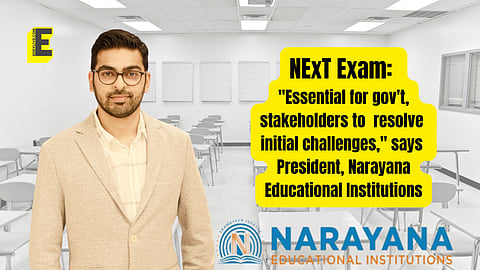

The National Exit Test (NExT) represents a significant step forward in India's medical education landscape.
I believe that this unified examination simplifies the evaluation process for medical graduates. By replacing three distinct assessments, it eliminates the need for candidates to sit for multiple exams — such as NEET PG and FMGE — to secure a medical license.
The key exams it subsumes include:
The final year MBBS examination
The National Eligibility cum Entrance Test for Postgraduates (NEET-PG)
The Foreign Medical Graduate Examination (FMGE)
In my experience, India’s current system of medical exams — including the final year MBBS, NEET-PG, and FMGE — presents various challenges for students.
They face intense academic pressure and fragmented assessments, which lead to stress, burnout, and inefficient learning.
Additionally, the variation in evaluation standards across these exams creates uncertainty about their career progression.
I see the NExT exam as a solution to these issues. It consolidates multiple assessments into a single, comprehensive test. This unified approach allows students to focus on mastering their curriculum rather than juggling several different exams.
It also ensures consistent national standards, promoting fairness and transparency across institutions.
Moreover, NExT emphasises clinically relevant learning.
From my perspective, prioritising practical skills alongside theoretical knowledge better prepares students for real-world healthcare challenges.
Replacing NEET-PG reduces the anxiety surrounding postgraduate admissions, offering a smoother, more predictable path forward.
For foreign medical graduates, NExT levels the playing field by replacing FMGE with a single exit exam, ensuring that all medical students — whether domestic or international — are assessed uniformly. This fosters inclusivity and fairness, which I strongly support.
Overall, I believe the NExT simplifies our medical education system, enhances student learning, and equips future doctors with the skills needed to excel in healthcare.
The NExT exam, developed with a visionary approach, ensures that India’s medical students are well-prepared for the future. It shifts the focus toward understanding key concepts rather than rote memorisation.
By consolidating multiple assessments, the NExT eases the burden on students while maintaining high standards for MBBS graduates.
I am confident that it will also promote healthy competition and motivate students to engage deeply in their studies.
Furthermore, the NExT exam is designed to align our medical education standards with globally recognised benchmarks.
This will enhance the global recognition of Indian medical licenses, which I consider crucial for the advancement of healthcare professionals in India.
Announcing exam dates promptly and adhering to them will allow students to prepare effectively. I am confident that the National Exit Test (NExT) offers significant benefits by reducing stress on students, standardising evaluations, and emphasising clinical skills.
It also creates equal opportunities for foreign medical graduates, ensuring a fair and transparent process for all.
Considering these advantages, it is essential that the government and all stakeholders work together to resolve any initial challenges. That said, I understand that the postponements and cancellations of the NExT exam have caused anxiety among students.
Hence, a clear, well-communicated timeline will ease concerns and restore confidence in the process. By adhering to a fixed schedule and providing adequate resources, I believe we can help students regain their focus, approach the exam confidently, and develop the resilience and skills necessary to thrive in the evolving landscape of medical education.
(Puneet Kothapa is the President of Narayana Educational Institutions. Views expressed are his own.)
